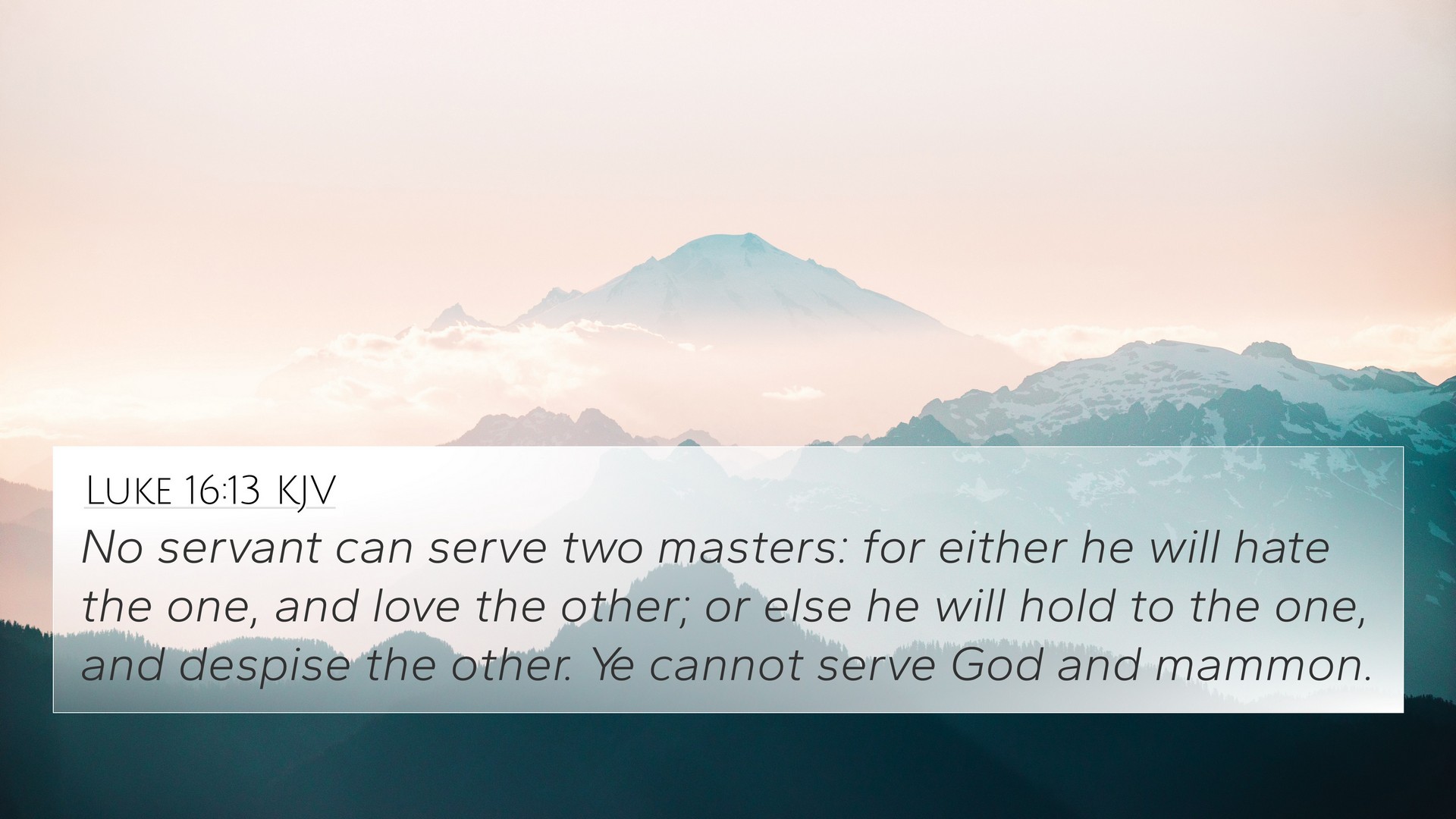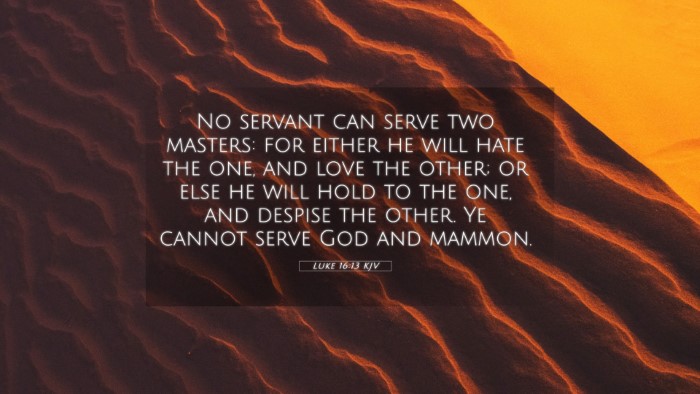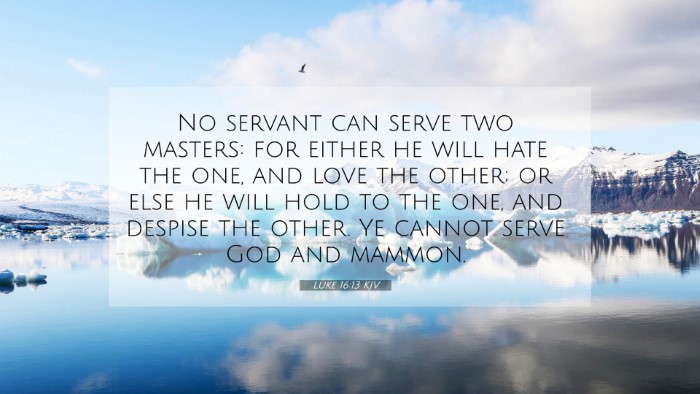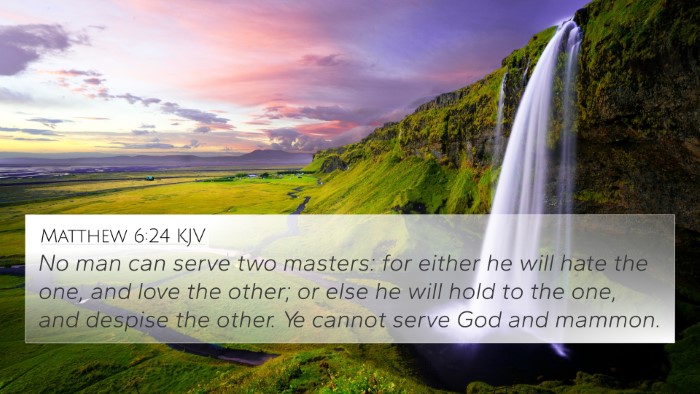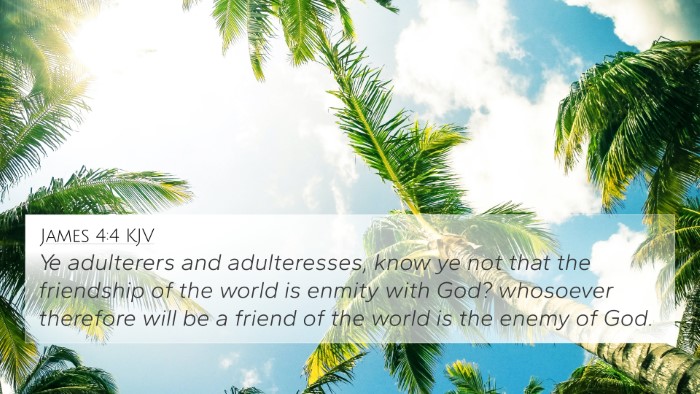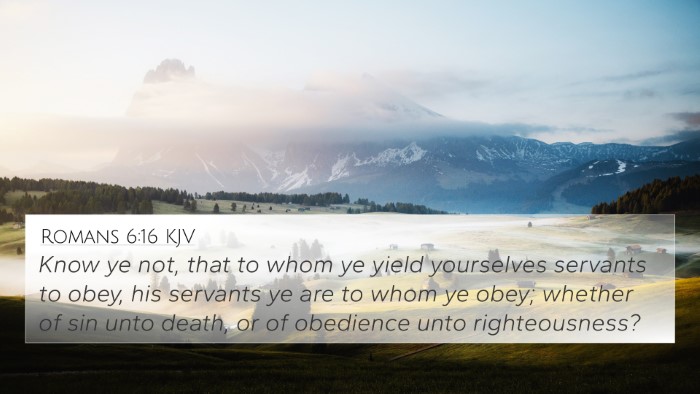Understanding Luke 16:13
Bible Verse: Luke 16:13
"No servant can serve two masters; for either he will hate the one and love the other, or else he will hold to the one and despise the other. You cannot serve God and mammon."
This verse emphasizes the impossibility of divided allegiance between God and worldly wealth (mammon). The servant's commitment mandates loyalty to one master, highlighting the conflict between spiritual devotion and materialism.
Verse Explanation
In this concise and direct teaching, Jesus employs the metaphor of a servant to illustrate the relationship between man and his obligations, spiritual versus material. Below are key insights derived from well-respected public domain commentaries:
-
Matthew Henry:
Henry emphasizes that there is a clear distinction between serving God and being enslaved by wealth. He points out that true service to God leads away from the love of money, which is often a competing master.
-
Albert Barnes:
Barnes notes the warning against the duality of service; one cannot genuinely fulfill their responsibilities to both God and material riches without one taking precedence over the other. He suggests that love for one will inevitably lead to a rejection of the other.
-
Adam Clarke:
Clarke elaborates on the Greek terms used in the verse, explaining the connotations of "serve," which implies a total commitment. He describes "mammon" as a deity of wealth and stresses the dangers of placing material wealth above spiritual dedication.
Thematic Connections
This verse can be cross-referenced with several other biblical texts that reflect its themes:
- Matthew 6:24: "No one can serve two masters..."
This parallel reinforces the core message of loyalty and singular devotion.
- 1 Timothy 6:10: "For the love of money is the root of all evil..."
Here, the scripture warns against the dangers of materialism, similar to Luke 16:13.
- James 4:4: "You adulterous people, don't you know that friendship with the world means enmity against God?"
This underlines the struggle between worldly affiliations and spiritual fidelity.
- Romans 12:2: "Do not conform to the pattern of this world..."
This encourages a focus on spiritual values over earthly concerns.
- Philippians 3:19: "Their god is their stomach, and their glory is in their shame..."
This connection illustrates the consequences of prioritizing worldly things above God.
- Matthew 19:24: "Again, I tell you, it is easier for a camel to go through the eye of a needle than for someone who is rich to enter the kingdom of God."
Highlighting the challenge wealth poses to spiritual commitments.
- Luke 12:15: "Watch out! Be on your guard against all kinds of greed; life does not consist in an abundance of possessions."
Reinforces the message that life is more than material gain.
Application of the Verse
This verse encourages believers to evaluate their priorities and allegiances. The challenge is not merely a theoretical one; it calls for practical discernment in daily life choices, urging individuals to reflect on whether they are serving God truly or are being swayed by other influences, particularly financial concerns.
Tools for Bible Cross-Referencing
To facilitate deeper study and understanding of this verse and its connections, various tools and methods may be employed:
- Bible Concordance: Useful for locating specific terms such as "serve," "master," and "mammon."
- Bible Cross-Reference Guide: Helps trace themes and teachings across different scripture passages.
- Cross-Reference Bible Study: Involves creating thematic links between multiple scriptures for comprehensive understanding.
- Bible Reference Resources: Aids in connecting scripture with its interpretive context and application.
Conclusion
Luke 16:13 serves as a profound reminder that our loyalties shape our spiritual lives. By utilizing tools for cross-referencing and exploring related verses, believers can gain a more comprehensive understanding of how Christ teaches about the interplay between wealth, service, and devotion to God.
